if 引导的非真实性条件状语从句 即 虚拟语气
10.23.梁if 引导的非真实性条件状语从句

学生姓名梁倩仪年级九授课时课时 5.6教学目标1.口语练习2.同步复习3.中考考点学习重点难点1.口语表达2.语法考点一.日常口语对话二.检查上次作业,讲解重难点三.语法点if 引导的非真实性条件状语从句通过动词形式的变化来表示说话人对发生的动作或存在的状态所持的态度或看法的动词形式称为语气,虚拟语气表示说话人所说的话不是事实,而是一种祝愿,建议或是与事实相反的假设等。
If 引导的条件状语从句分为真实和非真实条件句,非真实条件句应用虚拟语气。
如果要表示与现在或将来事实相反时,其虚拟语气结构为:句型条件从句主句谓语动词形式动词过去式(be动词用were) would+动词原形即:(从句)if +主语+动词过去式(be 动词用were), 一般过去时(主句) 主语+would+动词原形过去将来时如:If I had time, I would go for a walk.如果我有时间,我就会去散步。
(事实上我现在没有时间)If I were you, I would take an umbrella.假如我是你的话,我会带上雨伞。
(事实上我不是你)I would say no if someone asked me to be in a movie. 假如有人请我当电影演员,我会表示拒绝。
(事实上没有人请我当电影演员)1. pretend to do sth.假装做某事I pretended to sleep just now.pretend +从句假装… I pretended that I fell asleep.2. be late for 迟到如:I am late for work/ school/ class/ party.3. a few 与a little 的区别,few 与little 的区别⑴a few 一些修饰可数名词a little 一些修饰不可数名词两者表肯定意义如:He has a few friends. 他有一些朋友。
if引导的条件句中的虚拟语气

之袁州冬雪创作if引导的条件句中的虚拟语气虚拟语气暗示一种不克不及实现的假设.该语法主要用于if条件状语从句.一、if引导的条件状语从句的分类及虚拟条件句的断定1、可以把条件句分为两类:1).真实条件句(Sentences of Real Condition):凡是假设的情况发生性可以很大,就是真实条件句.例如:⑴、If I have time , I will help you with this work.如果我有时间会帮忙你做此工作的. (2)、If time permits, we'll go fishing together.(如果有时间的话,我们就一起去钓鱼.)2).虚拟条件句(Sentences of Unreal Condition):当假设是不大可以实现时,就是虚拟条件句.例如:⑴、If I were you , I would have attended the meeting. 如果我是你的话,就去参与会议了.⑵、If he had come here yesterday, he would have seen his old friend.假如他昨天来这儿的话,就会看见他的老朋友.⑴、If it had rained yesterday, we would have stayed at home.(如果昨天下雨的话,我们就会留在家里.)2、.if条件状语从句中虚拟语气的断定断定是真实条件句还是非真实条件句.只有在非真实条件句中才使用虚拟语气.通过句子意思,看假设的条件是否可以实现,可以实现是真实条件句,不克不及使用虚拟语气;假设的条件不克不及实现则是非真实条件句,要用虚拟语气.断定这个假设是与哪一个事实相反.通常有三种情况:①与过去事实相反.②与现在事实相反.③与将来事实可以相反.3、“后退一步法”后退一步法是指在准确地断定了该句与哪一事实相反后,按虚拟语气的后退一步法处理从句谓语动词的时态.即:在非真实条件状语从句中,谓语动词按正常情况“后退一步”.也就是:①与过去事实相反,在从句中用过去完成时形式暗示.②与现在事实相反,在从句中用过去一般时形式暗示.③与将来事实可以相反,在从句中用过去将来时形式暗示. 主句中则用情态动词would, should, could 等加一个与从句一致的动词形式.例:⑴、If I had come her yesterday, I would have s een him.⑵、If I were a teacher, I would be strict with my students.⑶、If it should snow tomorrow, they couldn't go out.4、注意事项①if条件句中如有were, should, had,可以省去if,并使用倒装语序.②在现代英语中if条件状与从句中的谓语动词如果是be其过去形式一般用were.二、虚拟语气在if 引导的条件句中的用法:(一)、暗示与现在事实相反的情况.其句子布局为:从句:if + 主语+ 动词的过去式(be 用were) + ……主句:主语+ would (should, could , might) + 动词原形+ ……例:1.If I were you, I would go with him.2.If the weather werefine, I would go there.如果天气好,我去那儿.(事实天气欠好)3.If I were you, I would read it again.如果我是你的话,我再读一遍.(事实上我不是你)4.Iftime permitted, I would write it again.如果时间允许的话,我再写一遍.(事实上时间不允许)5.If it weren’t snowing, we wouldn’t stay in the house.要是现在不下雪的话,我们就不会待在屋里.(事实上现在下雪)6.What would I do if I were in your place?要是我处于你地位我会怎么办?(事实上我不在你的位置上)7.If he hurried, he could catch the first bus.他要是快点可以赶上头班公共汽车.(可是他不着急)8.If it weren’t for your help, we would get into trouble.如果没有你们的帮忙,我们就会陷入窘境.(而事实上得到了你们的帮忙)9.If we had the manpower, we could open up even more land.如果有人力,我们还能开更多的荒地.10. If I were you, I would go with him.(从句If I were you, 主句I would go with him.)11. If I were you, I should buy it.(从句用过去式动词were,主句用动词原形buy)12. If I had time, I would study French.(如果有时间,我会学习法文.)(从句用过去式动词had,主句用动词原形study)13. If she knew English, she would not ask me for help.(如果她懂英文,她就不需要我帮了.)(从句用过去式动词knew, 主句用动词原形ask)注意:如果动作在停止中,主句要用:"主语+ would be + 停止式动词+ ……"14. If they were here, he would be speaking to them now.(从句用过去式动词were, 主句用would be speaking)。
虚拟语气在条件状语从句中的用法(if条件句)

在写作中的应用
创作文学作品中
在创作小说、诗歌等文学作品时, 虚拟语气可以用来表达虚构的情 节和角色情感,增强作品的情感
色彩和艺术效果。
撰写学术论文
在撰写学术论文时,使用虚拟语 气可以表达假设的情景或条件, 例如在讨论不同政策或方案的影
响时。
写邮件和信件
在写邮件或信件时,使用虚拟语 气可以表达礼貌和尊重,例如在
在撰写商务广告和宣传材料时,使用虚拟语气可以增强语 言的感染力和说服力,例如“假如您正在寻找更好的产品 ,那么您来对了地方。”
感谢您的观看
THANKS
if条件句中的虚拟语气与时间状语从句的时态不一致
总结词
当if条件句中的虚拟语气与时间状语从句的时态不一致 时,通常是为了强调或表达与时间状语从句相反的情 况。
详细描述
在英语语法中,当if条件句中的虚拟语气与时间状语从 句的时态不一致时,通常是为了强调或表达与时间状语 从句相反的情况。这种用法能够使句子更加生动和富有 表现力,突出说话者对某个特定时间点的态度或情感。 例如,在句子"If I had known the answer yesterday, I would have told you."中,虚拟语气"had known" 与时间状语从句的时态"yesterday"不一致,强调了说 话者对过去的遗憾或后悔。
虚拟语气在条件状语从 句中的用法(if条件句)
目录
CONTENTS
• 虚拟语气在条件状语从句中的基本结构 • 虚拟语气在条件状语从句中的用法 • 虚拟语气在条件状语从句中的特殊情况 • 虚拟语气在条件状语从句中的实际应用
01 虚拟语气在条件状语从句 中的基本结构
(完整版)if引导的条件句中的虚拟语气
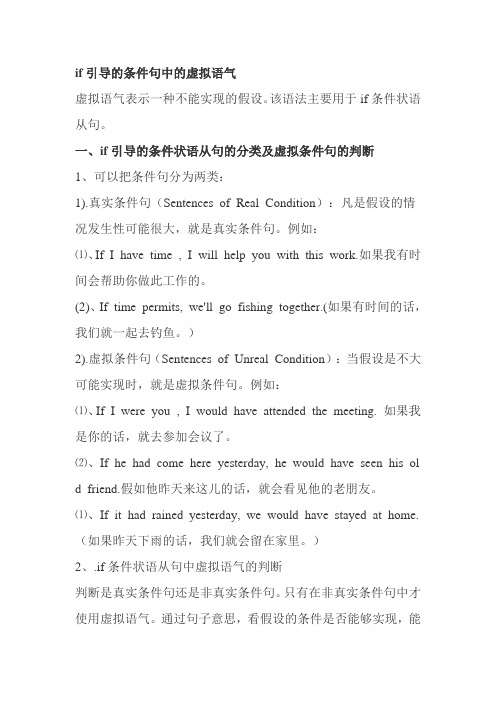
if引导的条件句中的虚拟语气虚拟语气表示一种不能实现的假设。
该语法主要用于if条件状语从句。
一、if引导的条件状语从句的分类及虚拟条件句的判断1、可以把条件句分为两类:1).真实条件句(Sentences of Real Condition):凡是假设的情况发生性可能很大,就是真实条件句。
例如:⑴、If I have time , I will help you with this work.如果我有时间会帮助你做此工作的。
(2)、If time permits, we'll go fishing together.(如果有时间的话,我们就一起去钓鱼。
)2).虚拟条件句(Sentences of Unreal Condition):当假设是不大可能实现时,就是虚拟条件句。
例如:⑴、If I were you , I would have attended the meeting. 如果我是你的话,就去参加会议了。
⑵、If he had come here yesterday, he would have seen his old friend.假如他昨天来这儿的话,就会看见他的老朋友。
⑴、If it had rained yesterday, we would have stayed at home.(如果昨天下雨的话,我们就会留在家里。
)2、.if条件状语从句中虚拟语气的判断判断是真实条件句还是非真实条件句。
只有在非真实条件句中才使用虚拟语气。
通过句子意思,看假设的条件是否能够实现,能够实现是真实条件句,不能使用虚拟语气;假设的条件不能实现则是非真实条件句,要用虚拟语气。
判断这个假设是与哪个事实相反。
通常有三种情况:①与过去事实相反。
②与现在事实相反。
③与将来事实可能相反。
3、“后退一步法”后退一步法是指在准确地判断了该句与哪一事实相反后,按虚拟语气的后退一步法处理从句谓语动词的时态。
if引导的条件状语从句的题目
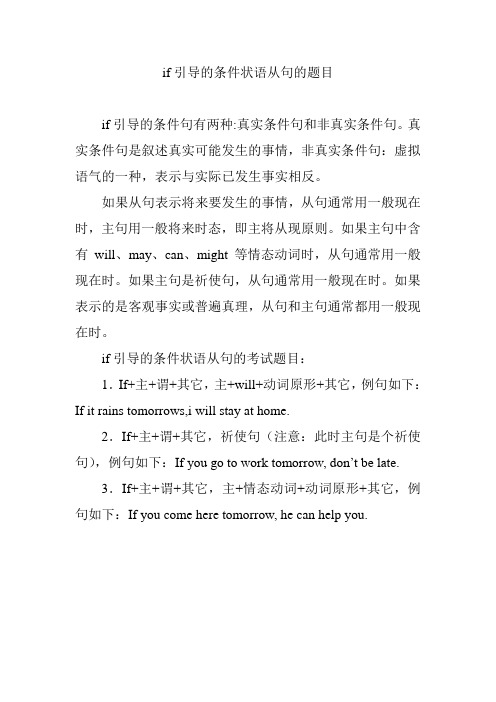
if引导的条件状语从句的题目
if引导的条件句有两种:真实条件句和非真实条件句。
真实条件句是叙述真实可能发生的事情,非真实条件句:虚拟语气的一种,表示与实际已发生事实相反。
如果从句表示将来要发生的事情,从句通常用一般现在时,主句用一般将来时态,即主将从现原则。
如果主句中含有will、may、can、might等情态动词时,从句通常用一般现在时。
如果主句是祈使句,从句通常用一般现在时。
如果表示的是客观事实或普遍真理,从句和主句通常都用一般现在时。
if引导的条件状语从句的考试题目:
1.If+主+谓+其它,主+will+动词原形+其它,例句如下:If it rains tomorrows,i will stay at home.
2.If+主+谓+其它,祈使句(注意:此时主句是个祈使句),例句如下:If you go to work tomorrow, don’t be late.
3.If+主+谓+其它,主+情态动词+动词原形+其它,例句如下:If you come here tomorrow, he can help you.。
if引导的条件句是什么从句

if引导的条件句是什么从句if 引导的条件句有真实条件句和非真实条件句两种;1、真实条件句:叙述真实可能发生的事情;例句:If you fail in the exam,you will let him down.如果你考试不及格,你会让他失望的。
扩展资料2、非真实条件句:虚拟语气的一种,表示与实际已发生事实相反:例句:If I were you, I would invite him.如果我是你,我会邀请他。
3、另一个常用连词为unless,大多数时候意思与 if not 相近:例句:Let's go out for a walk unless you are too tired.我们出去散步吧,除非你太累了。
例句:If you are not too tired, let's go out for a walk.如果你不太累,我们出去散步吧。
条件状语从句的基本用法1、用if引导:if意为“如果”。
例句:If you cheat in the exam you’ll never get away with it.考试作弊必予追究。
2、用unless引导:unless的意思是“如果不”“除非”。
例句:Unless you go at once you will be late.如果你不马上走,就会迟到的'。
3、用as [so] long as引导:as [so] long as的意思是“如果”“只要”。
例句:I’ll remember that day as long as I live.只要我活着,我就不会忘记那个日子。
4、用in case引导:in case用连词引导条件状语从句时,其意为“如果”“万一”。
例句:In case I forget, please remind me about it.万一我忘记,请提醒我一下。
5、条件状语从句的时态:当主句为将来时态或含有将来意义时,条件状语从句习惯上要用一般现在时表示将来意义,而不能直接使用将来时态。
8月1日试卷

Unit 4 He said I was hard-working1.both……and……两者都(谓语动词要注意对称原则)2.neither….nor两者都不(谓语动词要注意就近和对称原则)3.agree on something同意某人的计划见agree to do sth答应/同意做…4be supposed to do sth.被期望或被要求做... ...5do better in=be better at 在......方面做得更好6sound /feel /smell /taste /look 是连系动词,一般只能跟adj.做表语7sound like/feel like/smell like/taste like/look like听起来像…/感觉像…/闻起来像…/尝起来像…/看起来像…+sb./sth.8have a very hard time with.. 在---日子不好过本单元语法讲解直接引语和间接引语(一)直接引述别人的原话,叫做直接引语;用自己话转述别人的话,叫做间接引语。
1. 时态的变化:直接引语变为间接引语时,通常受转述动词said,asked等的影响而使用过去化的时态,即把原来的时态向过去推,也就是一般现在时变一般过去时,现在进行时变为过去进行时等。
例如:Tom said to me,“My brother is doing his homework.”→Tom said to me that his brother was doing his homework.2. 人称代词、指示代词、时间状语、地点状语等等的变化;根据意义进行相应的变化。
如:She asked Jack,“Where have you been?” →She asked Jack where he(二)直接引语改为间接引语时,都使用陈述语序,但是因为原句的句式不同,所以变成间接引语时所用的连词会有所不同。
if在条件状语从句中的用法归纳
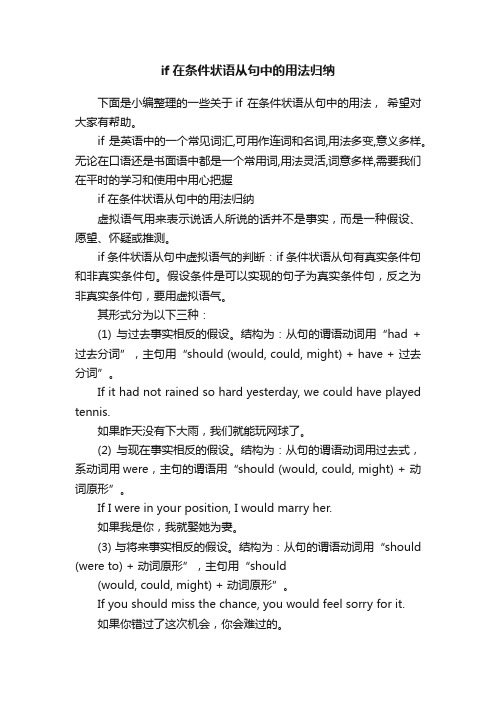
if在条件状语从句中的用法归纳下面是小编整理的一些关于if 在条件状语从句中的用法,希望对大家有帮助。
if是英语中的一个常见词汇,可用作连词和名词,用法多变,意义多样。
无论在口语还是书面语中都是一个常用词,用法灵活,词意多样,需要我们在平时的学习和使用中用心把握if 在条件状语从句中的用法归纳虚拟语气用来表示说话人所说的话并不是事实,而是一种假设、愿望、怀疑或推测。
if 条件状语从句中虚拟语气的判断:if 条件状语从句有真实条件句和非真实条件句。
假设条件是可以实现的句子为真实条件句,反之为非真实条件句,要用虚拟语气。
其形式分为以下三种:(1) 与过去事实相反的假设。
结构为:从句的谓语动词用“had + 过去分词”,主句用“should (would, could, might) + have + 过去分词”。
If it had not rained so hard yesterday, we could have played tennis.如果昨天没有下大雨,我们就能玩网球了。
(2) 与现在事实相反的假设。
结构为:从句的谓语动词用过去式,系动词用were,主句的谓语用“should (would, could, might) + 动词原形”。
If I were in your position, I would marry her.如果我是你,我就娶她为妻。
(3) 与将来事实相反的假设。
结构为:从句的谓语动词用“should (were to) + 动词原形”,主句用“shou ld(would, could, might) + 动词原形”。
If you should miss the chance, you would feel sorry for it.如果你错过了这次机会,你会难过的。
虚拟语气讲解
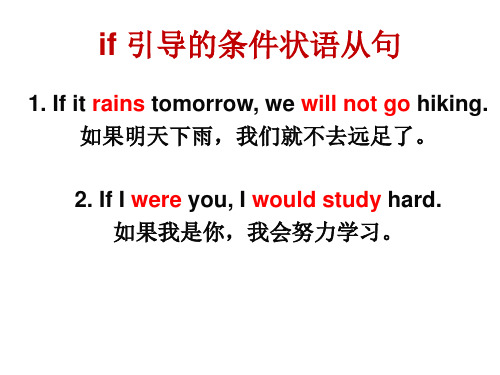
If I had a million dollars now, I would…
如果我有一百万美元,我会为我的家人买一座别墅。 If I had a million dollars now, I would buy a villa(别墅) for my family. 如果我有一百万美元,我会环游世界。 If I had a million dollars now, I would travel around the world. 如果我有一百万美元,我会去购物。 If I had a million dollars now, I would go shopping. 如果我有一百万美元,我会把它捐给慈善机构。 If I had a million dollars now, I would donate it to a charity organizaall match We would have won the match 如果杰克踢进那个球(score that goal), 如果我们还有多几分钟,
如果我们更加刻苦地训练,
如果本(Ben)把球传给了乔(Joe), 如果有成千的球迷为我们尖叫(scream for us), 如果我死死的盯住球(take one’s eyes off sth), 如果我前个晚上不熬夜(stay up late), 如果我们没有掉以轻心(take it easy), 如果我们没有精疲力竭(run out of), 我们本来是会得冠
虚拟(非真实)条件句 主句
与现在 事实相 反的假 设 与过去 相反的 假设
If+主语+动词的过去式 (动词be用were)
主语+should/
If+主语+had +过去分词
if引导的条件句中的虚拟语气
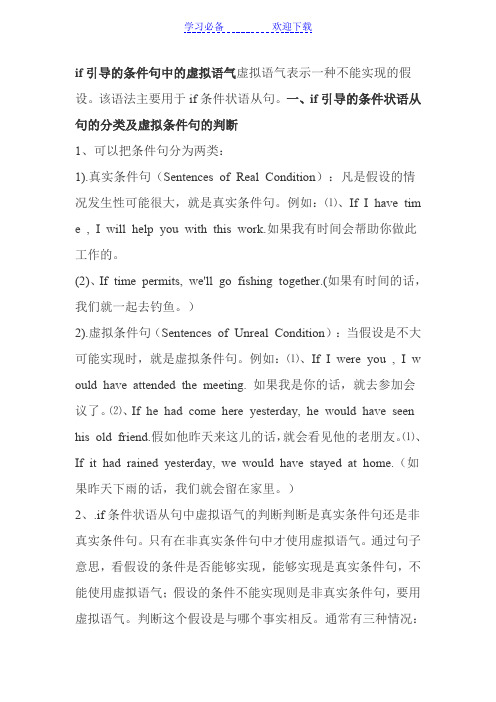
if引导的条件句中的虚拟语气虚拟语气表示一种不能实现的假设。
该语法主要用于if条件状语从句。
一、if引导的条件状语从句的分类及虚拟条件句的判断1、可以把条件句分为两类:1).真实条件句(Sentences of Real Condition):凡是假设的情况发生性可能很大,就是真实条件句。
例如:⑴、If I have tim e , I will help you with this work.如果我有时间会帮助你做此工作的。
(2)、If time permits, we'll go fishing together.(如果有时间的话,我们就一起去钓鱼。
)2).虚拟条件句(Sentences of Unreal Condition):当假设是不大可能实现时,就是虚拟条件句。
例如:⑴、If I were you , I w ould have attended the meeting. 如果我是你的话,就去参加会议了。
⑵、If he had come here yesterday, he would have seen his old friend.假如他昨天来这儿的话,就会看见他的老朋友。
⑴、If it had rained yesterday, we would have stayed at home.(如果昨天下雨的话,我们就会留在家里。
)2、.if条件状语从句中虚拟语气的判断判断是真实条件句还是非真实条件句。
只有在非真实条件句中才使用虚拟语气。
通过句子意思,看假设的条件是否能够实现,能够实现是真实条件句,不能使用虚拟语气;假设的条件不能实现则是非真实条件句,要用虚拟语气。
判断这个假设是与哪个事实相反。
通常有三种情况:①与过去事实相反。
②与现在事实相反。
③与将来事实可能相反。
3、“后退一步法”后退一步法是指在准确地判断了该句与哪一事实相反后,按虚拟语气的后退一步法处理从句谓语动词的时态。
If引导的虚拟语气

if条件句中的谓语动词
主句的谓语动词
1. 行为动词用did 2. should + 动词原形 3. were to + 动词原形
Should/would/could/might + 动词原形
• 虚拟语气中省略if:在书面语中,如果从句 的谓语中有were, had 或should, 就可以省略if, 并将were, had 或should 放到句首。当然, 如果从句没有were, had, 或should,就不能省 略if.
if引导的条件句
If she invites me tomorrow, I will go to the party.
请把这句话与下面虚拟语气的带条件从句的主从复合句进行比较:
If she invited me, I would go to the party.
假如她邀请我参加聚会,我就去。
If she had invited me yesterday, I would have gone to the party.
If I were to do it, I`d do it some other way. →Were I to do it, I’d do it some other way. If you should fail, try again. →Should you fail, try again. If you had been here earlier, you would have seen him. →Had you been here earlier, you would have seen him. I would have bought the house If I had had enough money. →I would have bought the house had I had enough money.
条件状语从句之虚拟语气

条件状语从句之一:虚拟语气条件句可分为两类,一类为真实条件句,一类为[1]非真实条件句。
非真实条件句表示的是假设或实际可能性不大的情况,故采用虚拟语气。
英语:If he doesn't hurry up,he will miss the bus.如果他不快点,他将错过巴士。
( 真实)If he is free,he will ask me to tell stories.如果他是空闲的,他会要求我讲故事。
(真实)If I were you,I would go at once.如果我是你,我马上就会去。
(我不可能是你。
非真实,虚拟语气)If there were no air,people would die.如果没有空气,人就会死亡。
(不可能没有空气。
非真实,虚拟语气)用法及动词形式1、表示与现在事实相反的情况:从句:If 主语+过去时(Be动词用were)主句:主语+should/would/could/might+doeg:1.If I were you,I would take an umbrella.如果我是你,我会带把伞。
(事实:我不可能是你)2.If I knew his telephone number,I would tell you.如果我知道他的电话号码,我就会告诉你。
(事实:不知道)3.If there were no air or water,there would be no living things on the earth.如果没有水和空气,地球上就不会有生物。
(事实:地球上既有空气也有水)4.If I had any money with me,I could lend you some.如果我带钱了,我就会借给你些。
(事实:没有带钱)5.If he studied harder,he might pass the exam.如果他再努力些,就能通过考试了。
if引导的条件句 与 虚拟语气 的 区别

if引导的条件句与虚拟语气的区别if引导的从句什么时候用虚拟语气最佳答案if引导的条件状语从句的分类及虚拟条件句的判断1、可以把条件句分为两类:1).真实条件句(Sentences of Real Condition):凡是假设的情况发生性可能很大,就是真实条件句。
例如:⑴、If I have time , I will help you with this work.如果我有时间会帮助你做此工作的。
⑵、As long as I say anything wrong, you must point it out.只要我说了什么错话,你一定要指出来。
⑶、If time permits, we'll go fishing together.(如果有时间的话,我们就一起去钓鱼。
)2).虚拟条件句(Sentences of Unreal Condition):当假设是不大可能实现时,就是虚拟条件句。
例如:⑴、If I were you , I would have attended the meeting. 如果我是你的话,就去参加会议了。
⑵、If he had come here yesterday, he would have seen his old friend.假如他昨天来这儿的话,就会看见他的老朋友。
⑴、If it had rained yesterday, we would have stayed at home.(如果昨天下雨的话,我们就会留在家里。
)2、.if条件状语从句中虚拟语气的判断判断是真实条件句还是非真实条件句。
只有在非真实条件句中才使用虚拟语气。
通过句子意思,看假设的条件是否能够实现,能够实现是真实条件句,不能使用虚拟语气;假设的条件不能实现则是非真实条件句,要用虚拟语气。
判断这个假设是与哪个事实相反。
通常有三种情况:①与过去事实相反。
②与现在事实相反。
③与将来事实可能相反。
if 非真实条件句中的虚拟语气
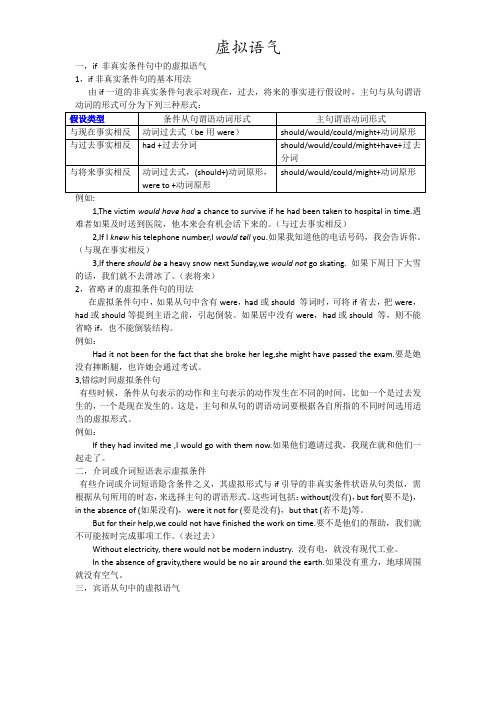
一,if 非真实条件句中的虚拟语气1,if非真实条件句的基本用法由if一道的非真实条件句表示对现在,过去,将来的事实进行假设时,主句与从句谓语动词的形式可分为下列三种形式:1,The victim would have had a chance to survive if he had been taken to hospital in time.遇难者如果及时送到医院,他本来会有机会活下来的。
(与过去事实相反)2,If I knew his telephone number,I would tell you.如果我知道他的电话号码,我会告诉你。
(与现在事实相反)3,If there should be a heavy snow next Sunday,we would not go skating. 如果下周日下大雪的话,我们就不去滑冰了。
(表将来)2,省略if的虚拟条件句的用法在虚拟条件句中,如果从句中含有were,had或should 等词时,可将if省去,把were,had或should等提到主语之前,引起倒装。
如果居中没有were,had或should 等,则不能省略if,也不能倒装结构。
例如:Had it not been for the fact that she broke her leg,she might have passed the exam.要是她没有摔断腿,也许她会通过考试。
3,错综时间虚拟条件句有些时候,条件从句表示的动作和主句表示的动作发生在不同的时间,比如一个是过去发生的,一个是现在发生的。
这是,主句和从句的谓语动词要根据各自所指的不同时间选用适当的虚拟形式。
例如:If they had invited me ,I would go with them now.如果他们邀请过我,我现在就和他们一起走了。
二,介词或介词短语表示虚拟条件有些介词或介词短语隐含条件之义,其虚拟形式与if引导的非真实条件状语从句类似,需根据从句所用的时态,来选择主句的谓语形式。
虚拟语气

虚拟语气☆If I had not pulled the sword out at first, I wouldn’t have fallen in love with her.☆If I were not the Monkey King, I wouldn’t give up her hands.☆If we should turn into common people some day, we would live happily with each other.虚拟语气表示说话人所说的不是事实,而是一种假设、愿望、怀疑或推测,它主要用于if条件状语从句,也可用于名词性从句1. if 引导的虚拟条件句2. 名词性从句3. 其他特殊虚拟语气4. 情态动词表示虚拟一.非真实性条件句即if条件句,也称为虚拟条件句。
表示一种纯属假设的情况或主观愿望时(情况与事实相反或者不太可能成为事实),动词需用一种特殊形式---虚拟语气If I had not pulled the sword out, I wouldn’t have fallen in love with her.时态_______ if从句谓语形式______________________ 主句谓语动词形式______________ If I were not the Monkey King, I wouldn’t let her go.时态_______ if从句谓语形式______________________ 主句谓语动词形式______________ If we should turn into common people some day, we would live with each other.时态_______ if从句谓语形式______________________ 主句谓语动词形式______________ 一般条件句中虚拟语气的用法注意:1.在虚拟条件句中,如果条件句中有were, had(助动词)或should时,通常省略if 而将were,should,had提到句首变成倒装句。
if条件状语从句中虚拟语气
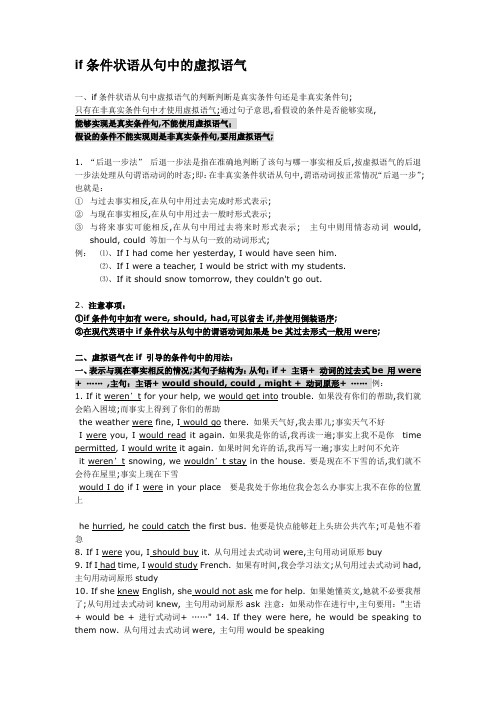
if条件状语从句中的虚拟语气一、if条件状语从句中虚拟语气的判断判断是真实条件句还是非真实条件句;只有在非真实条件句中才使用虚拟语气;通过句子意思,看假设的条件是否能够实现,能够实现是真实条件句,不能使用虚拟语气;假设的条件不能实现则是非真实条件句,要用虚拟语气;1. “后退一步法”后退一步法是指在准确地判断了该句与哪一事实相反后,按虚拟语气的后退一步法处理从句谓语动词的时态;即:在非真实条件状语从句中,谓语动词按正常情况“后退一步”;也就是:①与过去事实相反,在从句中用过去完成时形式表示;②与现在事实相反,在从句中用过去一般时形式表示;③与将来事实可能相反,在从句中用过去将来时形式表示;主句中则用情态动词would,should, could 等加一个与从句一致的动词形式;例:⑴、If I had come her yesterday, I would have seen him.⑵、If I were a teacher, I would be strict with my students.⑶、If it should snow tomorrow, they couldn't go out.2、注意事项:①if条件句中如有were, should, had,可以省去if,并使用倒装语序;②在现代英语中if条件状与从句中的谓语动词如果是be其过去形式一般用were;二、虚拟语气在if 引导的条件句中的用法:1. If it weren’t for your help, we would get into trouble. 如果没有你们的帮助,我们就会陷入困境;而事实上得到了你们的帮助the weather were fine, I would go there. 如果天气好,我去那儿;事实天气不好I were you, I would read it again. 如果我是你的话,我再读一遍;事实上我不是你time permitted, I would write it again. 如果时间允许的话,我再写一遍;事实上时间不允许it weren’t snowing, we wouldn’t stay in the house. 要是现在不下雪的话,我们就不会待在屋里;事实上现在下雪would I do if I were in your place要是我处于你地位我会怎么办事实上我不在你的位置上he hurried, he could catch the first bus. 他要是快点能够赶上头班公共汽车;可是他不着急8. If I were you, I should buy it. 从句用过去式动词were,主句用动词原形buy9. If I had time, I would study French. 如果有时间,我会学习法文;从句用过去式动词had,主句用动词原形study10. If she knew English, she would not ask me for help. 如果她懂英文,她就不必要我帮了;从句用过去式动词knew, 主句用动词原形ask 注意:如果动作在进行中,主句要用:"主语+ would be + 进行式动词+ ……" 14. If they were here, he would be speaking to them now. 从句用过去式动词were, 主句用would be speaking例如:⑴、If you had taken my advice, you would not have made such a mistake.如果你听了我的劝告,就不会犯这样的错误;事实上你没有听我的劝告⑵、I shouldn’t have been able to write such good novels if I hadn’t lived among the peasants for five years.如果我不是和农民生活了五年,就不可能写出这样好的小说;事实上我和农民生活了五年⑶、If you hadn’t invited me, I shouldn’t have come to the party.如果你不邀请我,我就不会来参加你的舞会;事实上你邀请了我⑷、If I hadn’t been ill yesterday, I might have come to school.昨天要是不生病,我是可能来上学的;事实上我生病了⑸、If he hadn’t broken the law, he wouldn’t have been put in prison.如果他不违法的话,就不会被打入监狱;事实上他违法了⑹、If I had been your headmaster, I should have dismissed you from school. 我要是你们校长的话,就把你开除学籍了;事实上我不是注意:如果动作在进行中,主句要用:"主语+ would + have + 完成进行式动词+……⑺、If they had been here, he would have been speaking to them.从句动词用had been, 主句动词用have been speaking⑴、I f I were to work at this problem, I would do it in another way.要是我来解这道难题,我会用另外一种方法的;⑵、I f you were to do such a thing again, you would be punished. 如果你再做这样的事情,就会受到惩罚;⑶、I f I should work harder, I could make much more progress.假如我更努力学习的话,我会取得更大的进步;事实上我不可能努力学习⑷、I f it should rain tomorrow, I would stay at home.如果明天下雨的话,我将待在家里;根据天气情况,明天不可能下雨⑸、I f he should come, I could ask him for some advice.万一他来了,我就能够向他请教;事实上他来的可能性很小⑹、I f he came tomorrow, I would do it with him.如果明天他来的话,我将和他一起做此事;事实上他来的可能性很小⑺、If it should rain, the crops would be saved.从句动词用should rain,主句动词用be 如果天下雨,庄稼可能就收获了;⑻、If he were here, I would give him the books.从句动词用were, 主句动词用give 如果他在这儿,我可能会把书给他;注意:如果动作在进行中,从句不是主句要用:"If + 主语+ 过去进行式动词+……"⑼、If she were staying here now, I would let her ride my horse.从句动词用were staying, 主句动词用let如果她现在留在这儿,我可能会让她骑我的马;。
if条件状语从句中虚拟语气
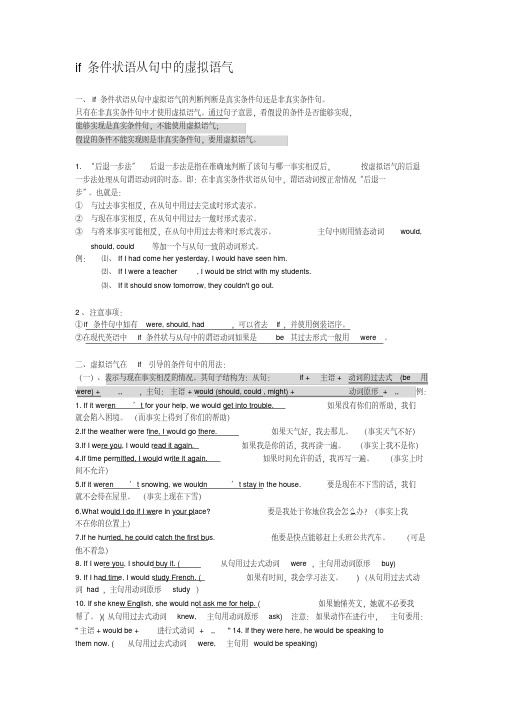
if条件状语从句中的虚拟语气一、if条件状语从句中虚拟语气的判断判断是真实条件句还是非真实条件句。
只有在非真实条件句中才使用虚拟语气。
通过句子意思,看假设的条件是否能够实现,能够实现是真实条件句,不能使用虚拟语气;假设的条件不能实现则是非真实条件句,要用虚拟语气。
1. “后退一步法”后退一步法是指在准确地判断了该句与哪一事实相反后,按虚拟语气的后退一步法处理从句谓语动词的时态。
即:在非真实条件状语从句中,谓语动词按正常情况“后退一步”。
也就是:①与过去事实相反,在从句中用过去完成时形式表示。
②与现在事实相反,在从句中用过去一般时形式表示。
③与将来事实可能相反,在从句中用过去将来时形式表示。
主句中则用情态动词would,should, could 等加一个与从句一致的动词形式。
例:⑴、If I had come her yesterday, I would have seen him.⑵、If I were a teacher, I would be strict with my students.⑶、If it should snow tomorrow, they couldn't go out.2、注意事项:①if条件句中如有were, should, had,可以省去if,并使用倒装语序。
②在现代英语中if条件状与从句中的谓语动词如果是be其过去形式一般用were。
二、虚拟语气在if 引导的条件句中的用法:(一)、表示与现在事实相反的情况。
其句子结构为:从句:if + 主语+ 动词的过去式(be 用were) + ,,,主句:主语+ would (should, could , might) + 动词原形+ ,,例:1. If it weren’t for your help, we would get into trouble. 如果没有你们的帮助,我们就会陷入困境。
(而事实上得到了你们的帮助)2.If the weather were fine, I would go there. 如果天气好,我去那儿。
if引导的非真实性条件状语从句即虚拟语气

if 引导的非真实性条件状语从句即虚拟语气通过动词形式的变化来表示说话人对发生的动作或存在的状态所持的态度或看法的动词形式称为语气。
.英语中的语气分三种:陈述语气、祈使语气、虚拟语气。
虚拟语气表示说话人所说的话不是事实,而是一种祝愿,建议,与事实相反的假设或实际可能性不大的情况等(即非真实的假设)。
If 引导的条件状语从句分为真实和非真实条件句(虚拟条件句)。
真实条件句表示在假设的条件下,有可能实现的情况。
非真实条件句表示的是假设的或实际可能性不大的情况,故采用虚拟语气。
Ifhedoesn’thurryup,hewillmissthebus.(真实条件状语)If he was free, he asked me to tell stories.(真实条件状语)If I were you, I would go at once.(非真实条件状语从句)If there was no air, peoplewould die.(非真实条件状语从句)1)非真实条件句中虚拟语气的基本形式。
假设类型条件从句的动词结果主句的动词与现在事实相反动词过去式(be只用wer e)would/should/could/might + 动词原形与过去事实相反had+过去分词would/should/could/might + have + 过去分词与将来事实相反动词过去式/(should/were to)+动词原形would/should/could/might + 动词原形①与现在事实相反If I had time, I would go for a walk.如果我有时间,我就会去散步。
(实际情况:我现在没有时间,也不会去散步。
)If I were you, I would take an umbrell a.假如我是你的话,我会带上雨伞。
if引导的条件状语从句和虚拟语气的区别

1.if引诱的前提状语从句和虚拟语气的差别if引诱的前提状语从句所引诱的是原因状语,可所以实际生涯中已经消失的真实事宜或有可能消失的工作,产生的可能性较大.而虚拟语气所引诱的往往长短真实的,对于曩昔,...if引诱的前提状语从句所引诱的是原因状语,可所以实际生涯中已经消失的真实事宜或有可能消失的工作,产生的可能性较大.而虚拟语气所引诱的往往长短真实的,对于曩昔,如今或未来的虚拟或揣摸,产生的可能性较小,或已经不成能产生了可以从2个角度去区分:1.时态A,由if引诱的前提状语从句平日都是主句为一般未来时,从句为一般如今时.B,而在虚拟语气中,时态都是有许多,往往都是依据句子的寄义断定,毕竟是与如今,曩昔照样未来的事实相反.2.真实与非真实A,由if引诱的前提状语从句一般都是真实的,只要所谓的前提成立,必定会成为事实B,但虚拟语气并不是如斯,if, 既然是虚拟,就必定长短真实的,可以依据句意断定其是...前提状语从句衔接词重要有 if, unless, as/so long as, on condition that 等.if 引诱的前提句有真实前提句和非真实前提句两种.unless = if not. 例如:Let's go out for a walk unless you are too tired. 假如不太累,我们去散漫步.If you are not too tied, let's go out for a walk. You will be late ___ you leave immediately.A. unlessB. untilC. ifD. or答案A.句意:除非你立刻走,不然你就回迟到的.可转化为If you don't leave immediately, you will be late.B.D 句意不合错误,or表转折,句子如为 You leave immediately or you will be late.虚拟语气1)虚拟语气用来暗示措辞人的主不雅欲望或设想,所说的是一个前提,不必定是事实,或与事实相反.虚拟语气在前提句中运用比较多.2)前提句可分为两类,一类为真实前提句,一类为非真实前提句.非真实前提句暗示的是假设的或实际可能性不大的情形,故采取虚拟语气.真实前提句用于陈述语气,假设的情形有可能产生.一般如今时shall/will + 动词本相祈使句情态动词一般如今时例如:If he comes, he will bring his violin. 假如他来,会带小提琴来的.The volleyball match will be put off if it ___.A. will rainB. rainsC. rainedD. is rained 答案B.真实前提句主句为未来时,从句用一般如今时.留意:1)在真实前提句中,主句不克不及用be going to暗示未来,该用shall, will.(错) If you leave now, you are never going to regret it.(对) If you leave now, you will never regret it. 2)暗示真谛时,主句谓语动词不必shall (will) +动词本相,而直接用一般如今时的动词情势.非真实前提句1)虚拟语气可以暗示曩昔,如今和未来的情形,时态的根本特色是时态往后推移.a. 与如今事实相反的假设一般曩昔时(be用were)should(would)等 +动词本相例如:If they were here, they would help you. 假如他们在这儿,会帮忙你的.寄义:They are not here, they can’t help you.b. 与曩昔事实相反的假设曩昔完成时should(would)等+ have+ 曩昔分词例如:If he had come yesterday, I should / wouldhave told him about it.假如他昨天来的话,我会把这件事告知他的.寄义:He did not come yesterday, so I did not tellhim about it.c. 暗示对未来不大可能产生的工作的设想一般曩昔时should/would等 + 动词本相were+ 不定式should+ 动词本相例如:If you succeeded, everything would be allright. 假如你未来成功了,一切都邑好的.If you should succeed, everything would be all right. If you were to succeed, everything would be allright.寄义:You are not likely to succeed, everything will be what it is now.。
if引导的条件状语从句和虚拟语气的区别

1.if引导的条件状语从句和虚拟语气的区别之袁州冬雪创作if引导的条件状语从句所引导的是原因状语,可以是现实生活中已经出现的真实事件或有能够出现的事情,发生的能够性较大.而虚拟语气所引导的往往是非真实的,对于过去,...if引导的条件状语从句所引导的是原因状语,可以是现实生活中已经出现的真实事件或有能够出现的事情,发生的能够性较大.而虚拟语气所引导的往往是非真实的,对于过去,现在或将来的虚拟或推断,发生的能够性较小,或已经不成能发生了可以从2个角度去区分:1.时态A,由if引导的条件状语从句通常都是主句为一般将来时,从句为一般现在时.B,而在虚拟语气中,时态都是有很多,往往都是根据句子的含义断定,毕竟是与现在,过去还是将来的事实相反.2.真实与非真实A,由if引导的条件状语从句一般都是真实的,只要所谓的条件成立,一定会成为事实B,但虚拟语气并不是如此,if,既然是虚拟,就一定是非真实的,可以根据句意断定其是...条件状语从句毗连词主要有 if, unless, as/so long as, on condition that 等.if 引导的条件句有真实条件句和非真实条件句两种.unless = if not. 例如:Let's go out for a walk unless you are too tired. 如果不太累,我们去散散步.If you are not too tied, let's go out for a walk.You will be late ___ you leave immediately.A. unlessB. untilC. ifD. or答案A.句意:除非你当即走,否则你就回迟到的.可转化为 If you don't leave immediately, you will be late.B、D句意分歧错误,or表转折,句子如为You leave immediately or you will be late.虚拟语气1)虚拟语气用来暗示说话人的主观愿望或假想,所说的是一个条件,纷歧定是事实,或与事实相反.虚拟语气在条件句中应用比较多.2)条件句可分为两类,一类为真实条件句,一类为非真实条件句.非真实条件句暗示的是假设的或实际能够性不大的情况,故采取虚拟语气.真实条件句用于陈述语气,假设的情况有能够发生.一般现在时shall/will + 动词原形祈使句情态动词一般现在时例如:If he comes, he will bring his violin. 如果他来,会带小提琴来的.The volleyball match will be put off if it ___. A. will rain B. rains C. rained D. is rained答案 B.真实条件句主句为将来时,从句用一般现在时. 注意:1)在真实条件句中,主句不克不及用be going to暗示将来,该用shall, will.(错) If you leave now, you are never going to regret it.(对) If you leave now, you will never regretit.2)暗示真理时,主句谓语动词不必shall (will)+动词原形,而直接用一般现在时的动词形式.非真实条件句1)虚拟语气可以暗示过去,现在和将来的情况,时态的基本特点是时态往后推移.a. 与现在事实相反的假设一般过去时(be用were)should(would)等 +动词原形例如:If they were here, they would help you. 如果他们在这儿,会帮忙你的.含义:They are not here, they can’t help you.b. 与过去事实相反的假设过去完成时should(would)等+ have+ 过去分词例如:If he had come yesterday, I should / would have told him about it.如果他昨天来的话,我会把这件事告诉他的.含义:He did not come yesterday, so I did not tell him about it.c. 暗示对将来不大能够发生的事情的假想一般过去时should/would等 + 动词原形were+ 不定式should+ 动词原形例如:If you succeeded, everything would be all right. 如果你将来成功了,一切都会好的.If you should succeed, everything would be allright.If you were to succeed, everything would be all right.含义:You are not likely to succeed, everything will be what it is now.。
- 1、下载文档前请自行甄别文档内容的完整性,平台不提供额外的编辑、内容补充、找答案等附加服务。
- 2、"仅部分预览"的文档,不可在线预览部分如存在完整性等问题,可反馈申请退款(可完整预览的文档不适用该条件!)。
- 3、如文档侵犯您的权益,请联系客服反馈,我们会尽快为您处理(人工客服工作时间:9:00-18:30)。
if 引导的非真实性条件状语从句即虚拟语气通过动词形式的变化来表示说话人对发生的动作或存在的状态所持的态度或看法的动词形式称为语气。
.英语中的语气分三种:陈述语气、祈使语气、虚拟语气。
虚拟语气表示说话人所说的话不是事实,而是一种祝愿,建议,与事实相反的假设或实际可能性不大的情况等(即非真实的假设)。
If 引导的条件状语从句分为真实和非真实条件句(虚拟条件句)。
真实条件句表示在假设的条件下,有可能实现的情况。
非真实条件句表示的是假设的或实际可能性不大的情况,故采用虚拟语气。
If he does n’t hurry up, he will miss the bus.( 真实条件状语)If he was free, he asked me to tell stories.(真实条件状语)If I were you, I would go at once.(非真实条件状语从句)If there was no air, people would die.(非真实条件状语从句)1)非真实条件句中虚拟语气的基本形式。
假设类型条件从句的动词结果主句的动词与现在事实相反动词过去式(be只用were)would/should/could/might + 动词原形与过去事实相反had+过去分词would/should/could/might + have + 过去分词与将来事实相反动词过去式/(should/were to)+动词原形would/should/could/might + 动词原形①与现在事实相反If I had time, I would go for a walk.如果我有时间,我就会去散步。
(实际情况:我现在没有时间,也不会去散步。
)If I were you, I would take an umbrella.假如我是你的话,我会带上雨伞。
(事实上我不可能是你。
)I would say no if someone asked me to be in a movie.假如有人请我当电影演员,我会表示拒绝。
(事实上现虚拟语气专项练习1.Were it not for the snowy weather, we __________all right.A. would beB. would have beenC. wereD. may be2. ________more careful, his ship would not have sunk.A. If the captain wereB. Had the captain beenC. Should the captain beD. If the captain would have been3. If he _________ me tomorrow, I would let him know.A. should callB. should not have been ableC. were not ableD. are not able4.If you asked your father, you ______________ permission.A. may getB. might getC. should have calledD. maybe get5._____________today, he would get there by Friday.A. Would he leaveB. was he leavingC. Were he to leaveD. If he leaves6.______I you, I would go with him to the party.A. WasB. Had beenC. Will beD. Were7.The millions of calculations involved, had they been done by hand, __________all practical value by the time they were finished.A. could loseB. would have lostC. might loseD. ought to have lost8.Had Paul received six more votes in the last election, he ________our chairman now.A. must have beenB. would have beenC. wereD. would be9.If you ________________Jerry Brown until recently, you'd think the photograph on the right was strange.A. shouldn't contactB. didn't contactC. weren't to contactD. hadn't contacted10.____________he English examination I would have gone to the concert last SundayA. In spite ofB. But forC. Because ofD. As for11.Look at the terrible situation I am in! If only I _____________your adviceA. followB. would followC. had followedD. have followed12.Had Paul received six more votes in the last election, he ____________our chairman now.A. must have beenB. would have beenC. wereD. hadn't contacted13.If the horse won today, it _____________ thirty races in five years.A. would have wonB. wonC. must have wonD. did have won14. There is a real possibility that these animals could be frightened, _______a sudden loud noise.A. being thereB. should there beC. there wasD. there having been17.I would have gone to visit him in the hospital, had it been at all possible, but I ______ fully occupied the whole of last week.A. wereB. had beenC. have beenD. was18.I apologize if I __________ you, but I assure you it was unintentional(无意的).A. offendB. had offendedC. should have offendedD. might have offended19. If you hadn't taken such a long time to get dressed, we'd______________ there by now.A. beB. circlesC. is circlingD. be circling20. The sun rises in the east and sets in the west, so it seems as if the sun ________round the earth.A. were circlingB. circlesC. is circling D . be circling21. I wish that I _______________ with you last night.A. wentB. have goneC. could goD. could have gone22. I wish I ___________ with her.A. would beB. amC. wasD. were23. I wish that I_____________ the concert last night.A. couldB. have attendedC. could have attendedD. attended24. The picture exhibition bored me to death. I wish I_______________ to it.A. had not goneB. have not goneC. did not goD. can not have gone25. "I wish you___________ me to put these things away," he said.A. will helpB. helpC. are helpingD. would help26. If the Watergate Incident_____________ Nixon would nothave resigned from the presidency.A. did not occurB. had not occurredC. was not occurringD. be circling27. I hadn't expected ________James to apologize but I had hoped .A. him calling meB. that he would call meC. him to call meD. that he call me28. George would certainly have attended the meeting, ____________________ .A. if he didn't get a flat tireB. if the flat tire hadn't happenedC. had he not had a flat tireD. had the tire not flattened itself29. The teacher suggested that her students _____________ experiences with ESP.A. write a composition on theirB. to write composition about theC. wrote some compositions of his or herD. had written any compositions for his30. He speaks Chinese as fluently as if he ______________a Chinese.A. wereB. had beenC. isD. has been31. As usual, he put on a show as though his trip____ a great success.A. had beenB. has beenC. wereD. was32. Looking round the town, he felt as though he ______________ away for ages.A. has beenB. wasC. isD. had been33. John is so strongly built that he looks as if he ______as elephant.A. liftsB. is liftingC. LiftedD. could lift34. He described the town as if he_____________ it himself.A. had seenB. has seenC. sawD. sees35. At that thought he shook himself, as though he _____________from an evil dream.A. wokeB. wakesC. would wakeD. had woke36. Most insurance agents would rather you ___________ anything about collecting claims until they investigate the situation.A. doB. don'tC. didn'tD. didn't do37. Although most adopted persons want the right to know who ______________their natural parents are, some who have found them wish that they the experience of meeting.A. hadn'tB. didn't have hadC. hadn't hadD. hadn't have38. It is important that the TOEFL office ________ your registration.A. will confirmB. confirmC. confirmsD. must confirm39. without electronic computers, much of today's ___________advanced technology.A. will not have been achievedB. have not been achievedC. would not have been achievedD. had not been achieved40. He speaks Chinese as fluently as if he ____________a Chinese.A. wereB. had beenC. isD. has been41. It is time that the government ______________measures to protect the rare birds and animals.A. takesB. tookC. has takenD. taking42. Some people are too particular about school records, insisting that every applicant ___all diplomas from elementary school to university.A. hasB. will haveC. should haveD. must have43. He was very busy yesterday, otherwise he _____ to the meeting.A. would comeB. CameC. would have comeD. had come44. I must say he reads very well, and I shouldn't be surprised if he___________ acting for a living one day.A. had taken upB. takes upC. have taken upD. would have taken up45. If I had seen the movie, I ______________ you all about it now.A. would tellB. will tellC. have toldD. would have told46. I hadn't expected ______Henry to apologize but I had hoped .A. him to call me upB. him calling me upC. that he would call me upD. that he will call me47. I had hoped that John ____________a year in Africa, but he stayed there only for three months.A. spendsB. spentC. would spendD. will spend48. I had hoped that Jennifer___________ a doctor, but she wasn't good enough at science.A. will becomeB. becameC. would becomeD. becomes49. I'd rather you ___________ anything about it for the time being.A. doB. didn't doC. don'tD. didn't50. I'd just as soon_______ rudely to her.A. that you won't speakB. you not speakingC. you not speakD. you didn't speak51. It's high time they____________ this road.A. mendB. mendedC. must have mendedD. will mend52. It's about time people______ notice of what women did during the war.A. takeB. tookC. have takenD. will take53. Everybody has arrived. It's time we___________ the class.A. shall startB. would startC. had startedD. start54. ___________ the English examination I would have gone to the concert last Sunday.A. In spite ofB. But forC. Because ofD. As for55. Mary ___my letter; otherwise she would have replied before now.A. has receivedB. ought to have receivedC. couldn't have receivedD. shouldn't have received56. John did not feel well yesterday; otherwise he _______to see his classmates off.A. cameB. would comeC. would have comeD. should be coming57. He's working hard for fear that he_____________ .A. should fall behindB. fell behindC. may fall behindD. would fall behind58. Without the dreams of the youth, this invention might____________ for a century.A. have been postponedB. has been postponedC. postponeD. be postponed59. In the past men generally preferred that their wives_______________ in the home.A. workedB. would workC. workD. were working60. For a child to give up his less mature idea for a more mature one, it requires that the child _____psychologically ready for the new idea.A. isB. wereC. beD. would be61. Tom's father, as well as his mother,_______________ in New York for a few days more.A. ask him to stayB. ask he to stayC. asks he staysD. asks he stay62. Your advice that_____________ till next week is reasonable.A. she waitsB. she waitC. wait sheD. she waited64. It was essential that we lease before the end of the month.A. singB. singedC. had signedD. were signing65. It is appropriate that some time ______thorough study of the results of the Apollo mission.A. devotes toB. devoted toC. is devoted toD. be devoted to答案与详解1.A.条件句表示与现在事实相反的虚拟。
